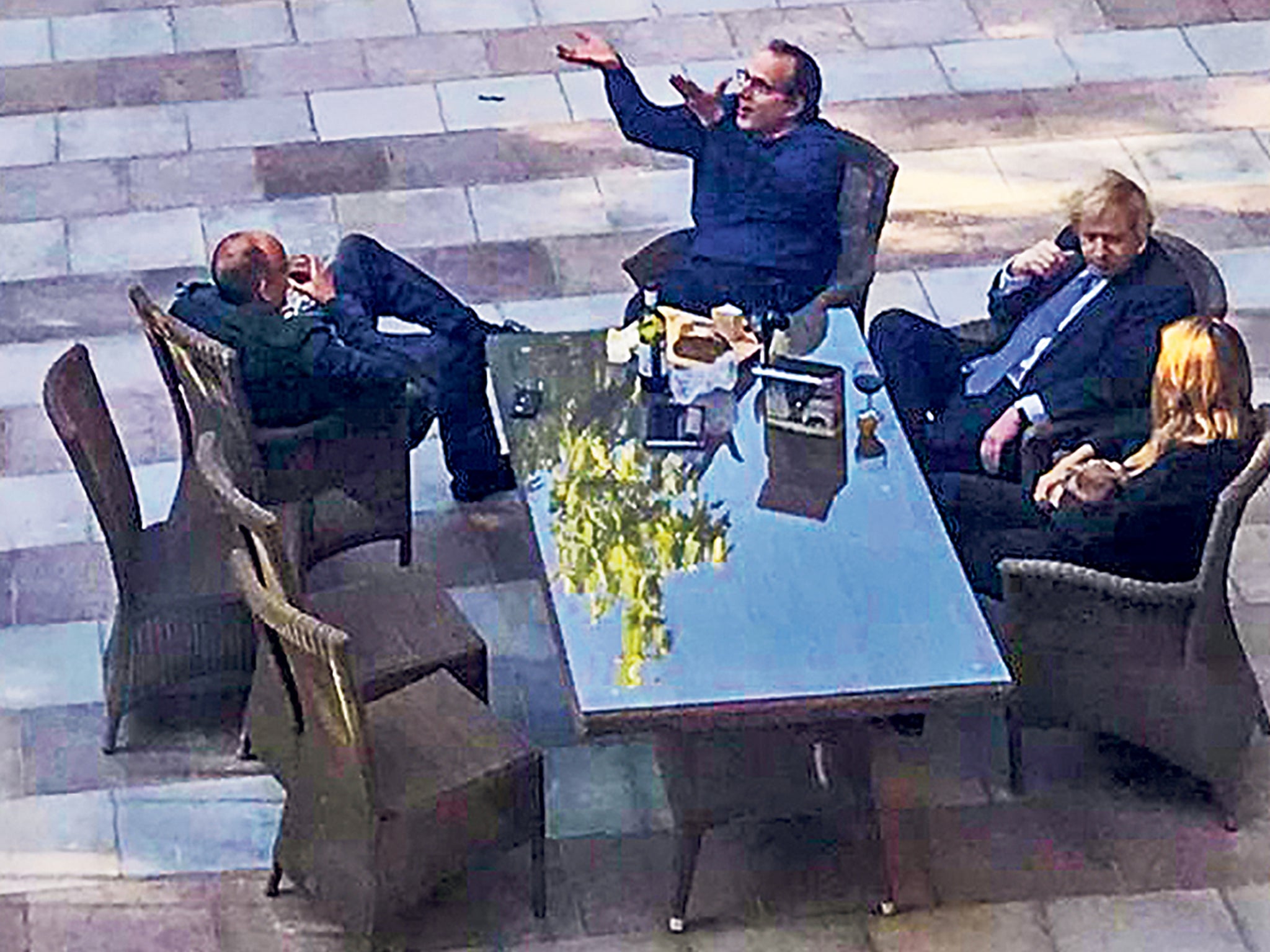Our politicians certainly seem to enjoy drinking on the job
Letters to the editor: our readers share their views. Please send your letters to letters@independent.co.uk

With all these “gatherings” involving cheese and wine at No 10, cabinet office and other ministerial private offices being explained away as “business meetings”, am I the only person concerned that our prime minister and his supporters consider it to be a perfectly acceptable narrative that they are working on our behalf while under the influence of alcohol? Surely, either they are working, and taking a salary from the taxpayer who would expect them to be sober; or they are not working? Maybe this explains some of the decision-making.
Carol Ferguson
York
Farewell, Lord Frost
Sajid Javid, the health secretary, called Lord Frost a “principled” man – the Brexit minister, who, together with his boss Boris Johnson, signed the Brexit agreement with eyes wide open and then tries to reneged on the agreement, especially on the Northern Ireland protocol.
Lord Frost failed England and the only “principled” action he took is that he stuck to his aggressive, non-compromising approach to the post-Brexit negotiation. A good proportion of the Northern Irish business community do think that the NI protocol is good for their business; being able to trade simultaneously with both UK and Ireland/EU. So, Lord Frost decided to abandon ship, hoping that a future PM may take him back on.
Meanwhile, Johnson has handed Liz Trus the “poisoned chalice” – to deal with a failed Brexit negotiation, perhaps hoping that she will fail too and therefore dislodge her from being the “most popular” and likely candidate to replace him.
Des McIng
Northern Ireland
As Lord Frost was able to become an unelected member of the government by being granted a peerage, can we expect that he will resign his seat in the House of Lords now that he has resigned from the government?
John Coppendale
Cambridge
Free healthcare requires all of us to fulfil our obligations
Further to Erica Wolf’s letter (Covid target, 20 December) reflecting on the preponderance of unvaccinated people blocking hospital facilities, I have often wondered why people belonging to a healthcare scheme – that is, a scheme providing healthcare when one is in need – should continue to get the full support of the scheme even when they disregard its advice. This does not seem reasonable to me. There are surely obligations on both sides.
Dennis Leachman
Kingston upon Thames
Chagos Islands
Rory Sullivan’s report (Chagos islanders fight for passports 50 years after being forcibly evicted by Britain, 18 December) focusses on the plight of separated Chagossian families who first came to the UK in 2002 because they were not allowed to return to their homeland. Members of the Chagos Islands All-Party Parliamentary Group have tried to redress this injustice by amending the current Nationality and Borders Bill which in January goes to the Lords for a second reading.
There is another way. The UK could honour its oft-repeated commitment to return the islands to Mauritius when no longer needed for defence purposes. Unlike the base on Diego Garcia, the 54 outer islands are not and have never been required for defence. Mauritius is committed to supporting and facilitating resettlement of Chagossians who wish to return. Most are Mauritian citizens. The official UN map now shows Chagos as part of Mauritius.
At its last meeting, the APPG questioned why, over the last 20 years, the Foreign Office had not negotiated an overall settlement with Mauritius and the Chagossians and continued to defy the UN and international courts. HMG could bring about a settlement that ends this relic of colonialism and the Cold War and restores Britain’s reputation as a leading nation that respects the rule of law, self-determination and human rights.
David Snoxell
Coordinator of the Chagos Islands
What to do about the ‘no presents’ rule breakers?
It’s the “no presents” rule which is at fault (Help! What to do when people ignore a “no presents” rule at Christmas?, 20 December). The problem with presents is people overblow them. Giving a small meaningful gift is not an issue; it’s the inflated cost/size/irrelevance of presents which increasing numbers of people dislike.
“No presents” is like saying “no love” to some. That’s why it’s an unworkable rule. Meaningful gifts represent love and affection. The word “gift” means something different and less bloated than “present”. So perhaps try: no presents, only meaningful gifts. And have a happier all-round Christmas.
Nick Dyne
Address supplied
Last time we all got together as a family at Christmas, we agreed no presents but everyone had to come with something to entertain the rest of us. As a result, we had a wonderful array of evening activities, including tango lessons, quizzes, wine tasting, board games, and a casino with cocktails. Such fun!
Myra Edwards
Address supplied
A good solution to your no presents dilemma would be to buy a couple of good board or card games to take along. They would be enjoyed by all the family over the Christmas holidays and you won’t feel too guilty when the rule breakers hand out their own gifts.
Lindsey Helm
Staines upon Thames
In response to Rupert Hawksley’s “no present” rule breakers dilemma – salve your guilt and win back the moral high ground by making a generous donation to a children’s charity in your family’s name. When the cheats in your family pull out their gifts, say you thought about buying something but thought they would prefer that you gave the gift of life/food/joy to the children instead. Good luck!
Sal Geere
Address supplied






Join our commenting forum
Join thought-provoking conversations, follow other Independent readers and see their replies
Comments